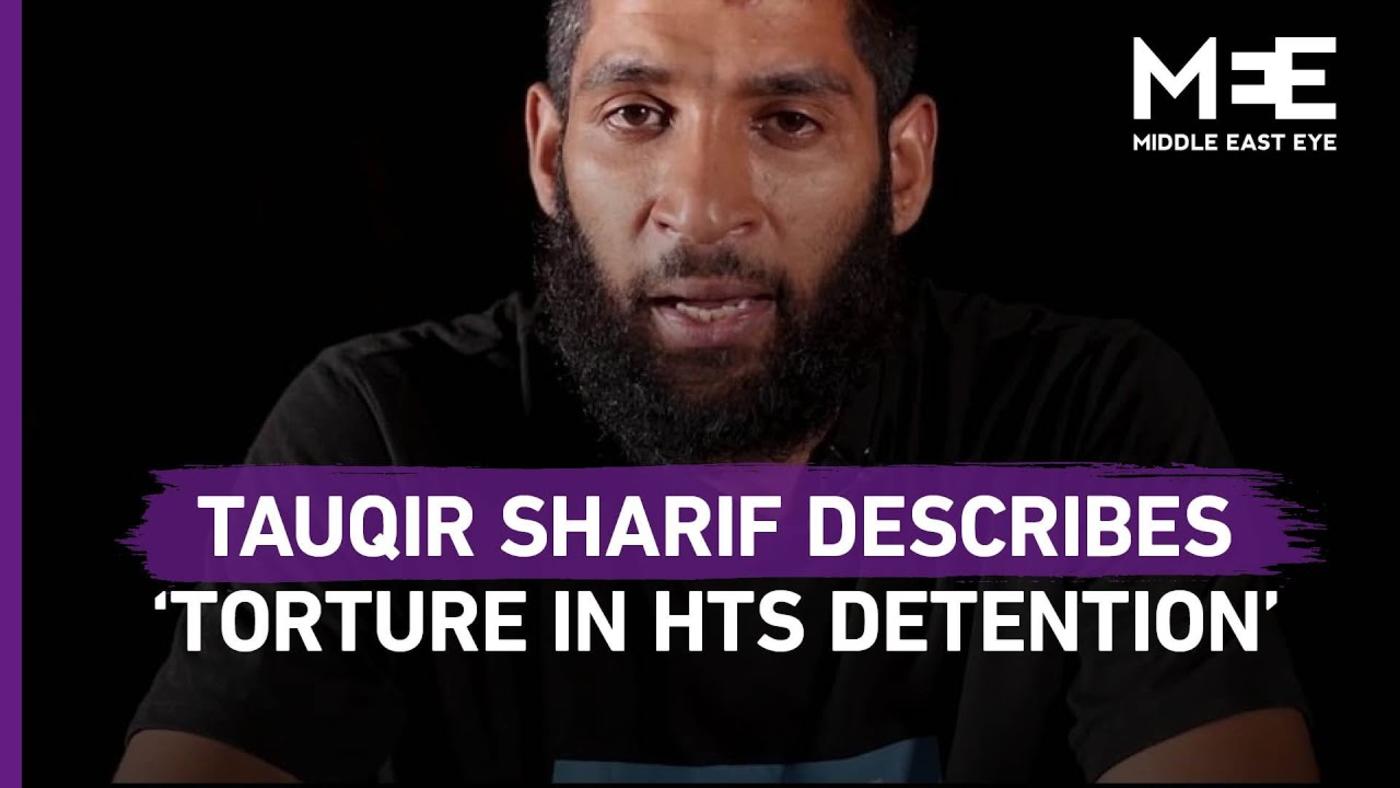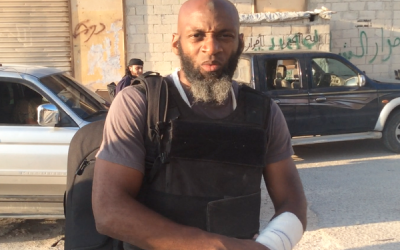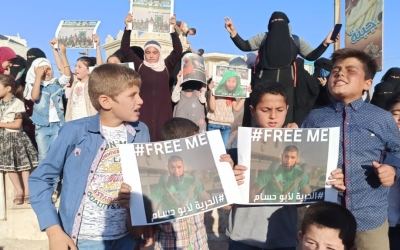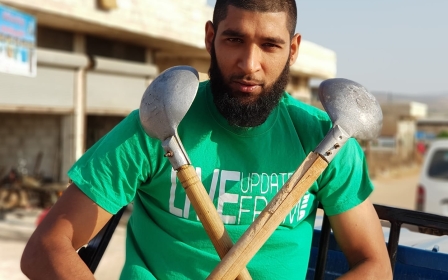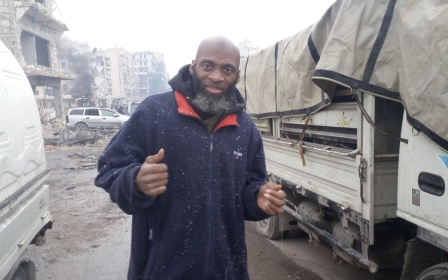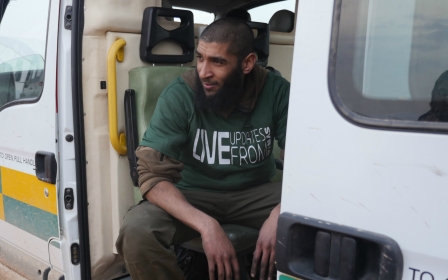Tauqir Sharif: Detained aid worker describes torture by HTS
The family of a British aid worker being held by Hay'at Tahrir al-Sham (HTS) in Syria's Idlib province released a video on Friday in which he described his alleged torture and interrogation during an earlier period in the group's custody.
Tauqir Sharif, who has been based in the Atmeh camp in northeastern Idlib since 2013, was initially arrested by HTS on 22 June, released on bail on 15 July and then detained again on 11 August.
HTS is a coalition of militant fighters, including some factions formerly aligned with al-Qaeda, that controls most of Idlib. A spokesperson for the group denied the existence of torture in its prisons.
'I zoned out. I just tried to focus on my reciting [of a verse from the Quran]. Of course the pain was excruciating'
- Tauqir Sharif
In the video, which was filmed while Sharif was free on bail, he described how his interrogators had used a torture method known as “the tyre”, in which a prisoner is bound and restrained in a vehicle tyre before being beaten.
“My hands were handcuffed behind my back and a tyre was squeezed over my knees and up to my waist and a metal bar was placed between my handcuffed arms and the tyre," said Sharif.
New MEE newsletter: Jerusalem Dispatch
Sign up to get the latest insights and analysis on Israel-Palestine, alongside Turkey Unpacked and other MEE newsletters
“At this point I was flipped over so my head was bent to the side and touching the floor, and my feet were in the air.”
Sharif, who was also blindfolded, said his interrogator then started to whip his feet and legs with a thick belt or wire. The beating had gone on for up to 10 minutes, he estimated.
“I zoned out. I just tried to focus on my reciting [of a verse from the Quran]. Of course the pain was excruciating.”
Sharif said the beating had taken place on his fourth day in custody, after he had been held in isolation in an underground cell for three days.
Prior to the beating, Sharif said his interrogator wanted to know the whereabouts of three other men, including Bilal Abdul Kareem, an Idlib-based American journalist and Middle East Eye contributor who had campaigned for Sharif to be freed.
Abdul Kareem, who filmed the interview for his On the Ground News (OGN) media organisation and also appears in the video, was arrested by HTS on 13 August and remains in custody.
MEE understands that HTS subsequently shut down OGN's office in Idlib and confiscated its equipment.
The other men were Abu al-Abd, an HTS defector who was involved in media work exposing the group's alleged abuses, and an Egyptian man named as Abo Shoaib. The interrogator also accused Sharif of having a secret farm that he was using as a hideout.
Sharif said he told the man that everyone knew where Abdul Kareem lived, that he did not know the whereabouts of the other men, and that he did not have a secret hideout.
“He said, 'I have orders to use force against you if you don't tell me where the secret hideout is'… He got really angry. He pushed me to the floor and said 'put the tyre on him'.”
Notorious torture technique
The use of a tyre to torture detainees is a notorious technique used by the Syrian government's security forces, according to Amnesty International. Human rights groups have also raised concerns about arbitrary arrests and the use of torture in areas under HTS's control.
“It is hard to believe that an organisation engaged in a bitter fight for survival against Assad’s forces would resort to the same tactics against as their enemies," said Moazzam Begg, outreach director for UK-based human rights group Cage, which has campaigned for Sharif and Abdul Kareem to be released.
"Over the past weeks I have received calls and messages from Syrians on the ground who have complained about this treatment. I’ve also heard from HTS who have said that they don’t torture and that it is against Islamic principles to do so. They need to prove this by taking the matter very seriously and ensuring that prisoners’ rights are protected and abusers held to account."
Sharif said he had decided to talk about his ordeal to highlight how prisoners were being abused.
He said he had challenged an HTS official about his experience, who told him that it was "completely halal" and permitted by a fatwa from a senior official.
"It wasn't only me who got tortured. I got it light because of who I am. Many of the people that I heard being tortured inside this secret prison suffered far, far worse than me. That is because they are normal Syrian people who don't have a following outside, who don't have people calling for their release."
Sharif, commonly known as Tox, is one of the most prominent foreign nationals in opposition-held Syria. His detention has prompted protests by Syrians, helped by his Live Updates from Syria aid organisation and a social media campaign calling for his release.
After his initial arrest, HTS said he was being investigated over alleged “mismanagement of humanitarian funds and its use towards projects that sow sedition and division”.
His second arrest came after an altercation with a man whom he had recognised as one of his interrogators while attending a court to register his solicitor's details, according to an account by his wife, Racquell Hayden-Best.
His driver, named as Muayad Khaluf, was also arrested.
In a statement, Sharif's family in London called for the two men and Abdul Kareem to be released immediately, and said they had been held for over two weeks “without access to any legal advice, medical assistance or family contact”.
“We further express our deep concern regarding incidents of torture that are taking place in northern Syria, including that of our son,” the statement said.
“It is now necessary for the relevant authorities to ensure no further torture is administered and all prisoner rights are codified to prevent further mistrust and abuse. It is incumbent upon the authorities to hold to account those who have abused their power and further subjected the Syrian people to hardship.”
The arrests of Sharif, Abdul Kareem and others come amid a wider crackdown on dissent and opposition by HTS.
Taqi al-Din Omar, an HTS spokesperson, denied the existence of torture in HTS prisons.
He said: "There is no torture. Originally the revolution was erected against injustice, tyranny, violation of rights and insulting of dignity... so how can there be torture? What is there is an arrest and follow-up until the court's ruling."
Commenting on the British aid worker's case, Din Omar said Sharif had been re-arrested over an altercation with a member of the committee considering his case, which amounted to a breach of his bail conditions. The committee member was also being investigated over the incident, he added.
"After several proceedings, the concerned authorities decided to cancel the bail after [Sharif] violated its conditions. They decided to keep him until a judicial decision [is reached] in relation to his first case and his second case," Din Omar said.
Abdul Kareem remained under investigation on charges including "stirring up sedition" and "inciting against the local authorities". A verdict in his case is expected in a few days, he said.
Middle East Eye delivers independent and unrivalled coverage and analysis of the Middle East, North Africa and beyond. To learn more about republishing this content and the associated fees, please fill out this form. More about MEE can be found here.


